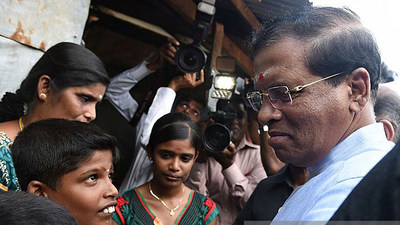WASHINGTON, Aug. 3, 2016 /PRNewswire-USNewswire/ — Six former Sri Lankan army corporals accused of murder and rape in the massacre of 24 Tamils including 13 children in 1996 in the town of Kumarapuram near Trincomalee were all acquitted on every charge on July 27 at a court in Anuradhapura. The ethnic Tamils were targeted for murder and mayhem by the all Sinhalese military, allegedly following orders by a divisional commander, according to Peace Brigades International.
Following the acquittal US Tamil Political Action Council (USTPAC) President Dr. Karunyan Arulanantham noted, “This trial not only took an unconscionable 20 years, but also demonstrates the lack of will by the judicial system to treat mass atrocity crimes against Tamils – particularly those by the security forces– in a fair manner, entrenching impunity.”
Few cases of violations against Tamils reach trial and of those only a few have resulted in convictions in the decades since the first anti-Tamil pogrom in 1956. In that period tens of thousands of Tamils have been killed, disappeared, tortured, sexually abused and displaced with no recourse. “This acquittal revalidates Tamils’ loss of faith in the Sri Lankan judicial system to deliver justice.”
“Because of an almost total lack of justice from Sri Lankan state institutions, Tamils firmly believe that for justice for the war crimes and crimes against humanity committed during and after the recent war to be at all credible, Sri Lanka must fulfill commitments made by the current government to the UN Human Rights Council in Oct. 2015 through Resolution 30/1,” said Dr. Arulanantham.
In that Resolution Sri Lanka pledged to ensure that ‘Commonwealth and other foreign judges, defense lawyers, and authorized prosecutors and investigators’ would be involved in the judicial process it is setting up to bring about justice for the serious crimes committed. USTPAC is appalled by the repudiation of this commitment by Sri Lanka’s President and Prime Minister, and subsequent endorsement by the Foreign Minister in numerous public statements recently.
USTPAC urges the Sri Lankan government to live up to its international commitments and use international expertise and resources sufficiently to assure a speedy and ethnically neutral judicial process to adjudicate the serious violations of international humanitarian law, since impunity for these crimes is a complete impediment to reconciliation. Any judicial process must be credible to the victims, and must be set up with their involvement and consultation.
USTPAC also urges the current Sri Lankan government to facilitate reconciliation through educating the Sinhalese population about the need for transitional justice, supporting robust consultations with victims, enacting laws to criminalize war crimes and mass atrocities, and setting aside funds for reparations.
USTPAC appeals to the United States Government, the UN Human Rights Council and the rest of the international community to work with Sri Lanka to assure that robust, credible and timely transitional justice mechanisms are put in place to allow people of all ethnicities to move forward together. “The credibility of all states that cosponsored Resolution 30/1 and that of the UN Human Rights Council is at stake, and international efforts should continue in earnest to effect a successful transitional justice process in Sri Lanka leading to a peaceful, just and ethnically diverse state,” stated Dr. Arulanantham.
Since the passage of UNHRC Resolution 30/1, USTPAC has repeatedly stated in every available forum that the first step for a strong transitional justice process is confidence-building among abused populations. USTPAC, along with other Tamil organizations inside and outside Sri Lanka, has emphasized that these confidence-building measures include:
- Immediate repeal of the PTA laws and release of all prisoners held indefinitely under its provisions.
- Security sector reform, especially return of all Tamil property occupied by the armed forces, end to intrusion in civilian activities in the NorthEast by the armed forces, and rapid demilitarization.
USTPAC reiterates the necessity of institutional change to prevent recurrence of conflict, one of the pillars of transitional justice. In the re-writing of the constitution now underway in Sri Lanka, USTPAC has urged for
- change in the nature of the state from unitary to federal
- re-merger of the Northern and Eastern Provinces
SOURCE USTPAC
